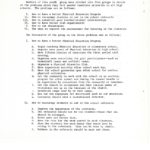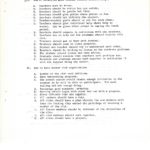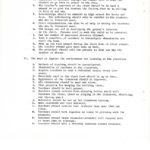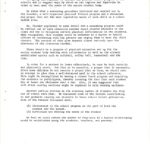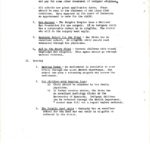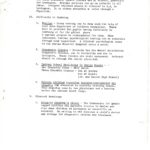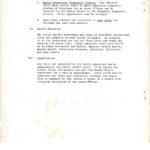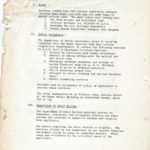Pine Mountain Settlement School
Series: EDUCATION
1963 RURAL YOUTH GUIDANCE INSTITUTE REPORT (pp. 49-58)
TAGS: 1963 Rural Youth Guidance Institute Report (pp. 49-58) ; physical education ; school cafeterias ; clubs ; absenteeism ; classroom environment ; nutrition ; teacher-student relationships ; health education ; screenings ; drop-outs ; Harlan County health and social resources ; physical handicaps ; immunizations ; mental handicaps ; diphtheria ; smallpox ; tetanus ; polio
The 1963 Guidance Institute Report covers the 22nd annual meeting of youth leaders in Harlan County, Kentucky. The meetings were sponsored by Harlan County Board of Education, Harlan Independent Board of Education and the Lynch Independent Board of Education.
The following are images and transcriptions of the last nine pages of the 1963 GUIDANCE INSTITUTE REPORT (pp. 49-58).
See also:
1963 GUIDANCE INSTITUTE REPORT (pp. 1-25)
1963 GUIDANCE INSTITUTE REPORT (pp. 26-37)
1963 GUIDANCE INSTITUTE REPORT (pp. 38-48)
The PMSS Collections also contain material from several Youth Guidance Institutes held at the Pine Mountain Settlement School in the 1930s and 1940s. Images of those documents have been downloaded to this site and links to this material can be found here.
GALLERY – 1963 RURAL YOUTH GUIDANCE INSTITUTE REPORT (pp. 49-58)
- 1963 Guidance Institute Report. “Our Youth: Needs and Resources,” p. 49.
- 1963 Guidance Institute Report. “Our Youth: Needs and Resources,” p. 50.
- 1963 Guidance Institute Report. “Our Youth: Needs and Resources,” p. 51.
- 1963 Guidance Institute Report. “Our Youth: Needs and Resources,” p. 52.
- 1963 Guidance Institute Report. “Our Youth: Needs and Resources,” p. 54.
- 1963 Guidance Institute Report. “Our Youth: Needs and Resources,” p. 55.
- 1963 Guidance Institute Report. “Our Youth: Needs and Resources,” p. 56.
- 1963 Guidance Institute Report. “Our Youth: Needs and Resources,” p. 57.
- 1963 Guidance Institute Report. “Our Youth: Needs and Resources,” p. 58.
TRANSCRIPTION – 1963 RURAL YOUTH GUIDANCE INSTITUTE REPORT (pp. 49-58)
[Note: Text has been slightly edited.]
[Scan_0049.jpg] Carbon copy of typewritten report, page 49.
-49-
YOUTH GROUP “C”
Leader . . . . . . . . . . . . . . Mrs. Dalton Buttermore
Recorder. . . . . . . . . . . . . Miss Patricia Castle
Reporter . . . . . . . . . . . . . Darlene Napier
Members of this youth group were divided into five groups to decide on the problems which they felt needed immediate attention in all high schools. The problems are as follows:
I. How to have a better Physical Education Program
II. How to encourage students to eat in the school cafeteria
III. How to establish good teacher-student relationships
IV. How to have better club organization
V. How to cut absenteeism
VI. The ways to improve the environment for learning in the classroom
The discussion of the group on the above problems was as follows:
1. How to have a better Physical Education Program
A. Begin teaching physical education in elementary school.
B. Require more years of Physical Education in high school.
C. Have fifteen minutes of exercises the first period each morning.
D. Organize more activities for girl participants — such as basketball teams and softball teams.
E. Organize a Physical Education Club.
F. Have supervised activity after school each day.
G. Have the school gymnasium open after school for various physical activities.
H. Get the community to work with the school on an activity program for after school and during the summer months to be supervised by volunteers from the community or teachers,
I. Get the church to co-operate and have various means of recreation set up in the basement of the church.
I. Establish camps near by or rent camps.
K. Use our own resources for activities such as our mountains.
L. Community should hire a recreational director.
11. How to encourage students to eat in the school cafeteria
A. improve the appearance of the cafeteria.
B. The cafeteria should not be too crowded — those that are should be enlarged.
C. Serve more and better food.
D. Have the menu for the week posted in each classroom.
E. Show the students how much money they would save by eating in the cafeteria. This can be done by charts.
F. Workers in the cafeteria should be neat and clean.
[Scan_0050.jpg] Carbon copy of typewritten report, page 50.
-50-
G. Educate the student in Nutrition by:
1. Have an assembly program once a month with speakers from the health and dietary profession.
2. Have posters throughout the school
3. Adult teaching through the PTA.
III. How to establish good teacher-student relationships.
A. Teachers must be human.
B. Teachers should be strict but not unfair.
C. Teachers should be gentle but firm.
D. Teachers should give praise where praise is due.
E. Teachers should not ridicule the student.
F. Teacher-student goals should be set for each class.
G. Teachers should give individual help where help is needed. Can be given after school or during the lunch period.
H. Teachers should compete in activities with the students.
I. Teachers are to help and the students should realize this fact.
J. Teachers should get to know each student.
K. Students should come to class prepared.
L. Student and teacher should try to understand each other.
M. Teachers should be willing to listen to the students’ problems.
N. The student should listen and take advice.
O. Students should realize that teachers have problems, too.
P. Teachers and students should work together in activities with the teacher being the leader.
IV. How to have better club organization
A. Leader of the club needs ambition.
B. Have interesting programs.
C. The school system should create enough initiative in the student so he will be able to participate. Too much telling and not enough doing.
D. Encourage good academic standing
E. Meeting should be in with order and end with a program.
F. Elect officers that are capable.
G. All members should have a duty.
H. All clubs should have a plan whereby the new members will have the feeling they earned the privilege of becoming a member of the club.
I. All future members should be informed of the objectives of the club.
J. All club members should work together.
K. All clubs should have a project.
[Scan_0051.jpg] Carbon copy of typewritten report, page 51.
-51-
V. How to cut absenteeism
A. Orientation program for students entering high school.
B. Refrain from the now existing social problem of forming “cliques”.
C. Every student needs to feel needed.
D. Employers of students through the summer need to urge the student to go back to school in the fall.
E. The teacher’s approach of the class should be in such a manner as to give the student the feeling that he is willing to help in any way.
F. Scholarships should be awarded in high school for books and fees. The scholarship should only be awarded to the students who are in financial need.
G. Civic organizations can also be of help in aiding the students who are in financial need.
H. PTA Groups can aid in developing the parent’s interest in the child. Parents need to want the child to be educated.
I. Cut the number of unexcused absences allowed.
J. Form a committee of teachers to investigate absenteeism and visit the home.
K. Make up the time missed during the lunch hour or after school.
L. The teacher should give more make-up work.
M. The principal should call the parents to find out why the student is absent.
VI. The ways to improve the environment for learning in the classroom
A. Methods of teaching should be investigated. B. Observation of teachers in the classrooms.
C. Require teachers to take a refresher course every five years.
D. Materials used in the classroom should be up to date.
E. Appearance of the classroom should be improved.
F. All classrooms should be neat and clean.
G. Club projects for keeping the building clean.
H. Teachers should be well poised.
I. Teachers should refrain from annoying habits which will distract the class (such as singing in the classroom, whistling, and chewing gum).
J. Schedules should be set up for classroom testing.
K. More class work and less homework.
L. Teachers should realize that students have more than one class.
M. Teachers should work together as teams in planning work for students.
N. Teachers should trust students — students will respond more to trust than to distrust.
O. Teachers should have a friendly attitude toward students.
[Scan_0052.jpg] Carbon copy of typewritten report, page 52.
-52-
YOUTH GROUP “D”
Leader . . . .. . . . . . . . . . . . .Mr. Roland Cornett
Recorder . . . . . . . . . . . . . . Mr. Walter Dick
Reporter . . . . . . . . . . . . . . . Marva Jean Perry
Our group met together to discuss the present health program in our schools and to suggest ways by which we can improve and improvise in order to best meet the needs of the entire student body.
We think that a screening procedure initiated and carried out by the teacher, a well-organized physical fitness program and a wholesome and proper diet are the most imperative needs of each child in a school health plan.
Dr. Fischer explained in some detail how a screening program could be carried out if each classroom teacher would observe students in the class and try to recognize certain physical deficiencies in the students. Once recognized, this student could be referred to a doctor or health officer by conferring with the parents and urging them to have the child checked. The success of this plan depends almost entirely upon the alertness of the classroom teacher.
There should be a program of physical education set up for the entire student body dealing with calisthenics as well as the already established sports such as softball, volley ball, basketball and the like.
In order for a student to learn effectively, he must be both mentally and physically alert. For this to be possible, a proper diet is necessary. Since some children do not receive a proper diet at home, we should make an attempt to give them a well-balanced meal in the school cafeteria. This might be accomplished by having a closed lunch program and requiring the students to participate, thereby ensuring the fact that each student has at least one wholesome meal a day. Also, it was suggested that soft drink vending machines might be replaced by milk vending machines.
Another serious problem is the alarming number of students who drop our of school each year. We discussed some of the factors contributing to and probably causing our students to leave school before graduation. Some of the reasons discussed were:
(1) Disinterest in the school program on the part of both the student and the parent.
(2) Curriculum not meeting the needs of the student
We feel we could reduce the number of drop-outs if a better relationship could be established among the students, teachers, and parents.
[Scan_0053.jpg] IMAGE IS MISSING
[Scan_0054.jpg] Carbon copy of typewritten report, page 54.
-54-
RESOURCES OR HARLAN COUNTY CHILDREN
A. HEALTH
I. VISUAL HANDICAPS
II. HEARING DIFFICULTIES
II. SPEECH DISORDERS
IV. DIFFICULTY IN LEARNING
V. PHYSICAL HANDICAPS
VI. HEALTH EDUCATION
VII. IMMUNIZATION
B. SOCIAL
I. FUNDS COMMON IN HARLAN COUNTY THAT WILL OFTEN PAY FOR CARE
II. DIVISION OF PUBLIC ASSISTANCE
IIl. DIVISION OF CHILDREN’S SERVICES
IV. EMPLOYMENT SERVICE
[Scan_0055.jpg] Carbon copy of typewritten report, page 55.
-55-
A. Health
I. Vision
1. Eye exams — The Lion’s Club provides eye screening charts to schools. The Lion’s Club will pay for examinations by eye specialists, and pay for some other treatment of indigent children.
All schools are given application forms. Those should be sent to the chairman of the Lion’s Club Committee. Upon approval by the Board of Directors an appointment is made for the child.
2. Eye Surgery — The Knights Templer have a National Eye Foundation for eye surgery. If an indigent child has a correctable defect he is eligible. The doctor who will do the surgery must apply.
3. Kentucky School for the Blind — Our state has an excellent school. An eligible child should seek admission through his physician.
4. Aid to the Needy Blind — Certain children with visual handicaps are eligible. This again should go through medical referral.
II. Hearing
1. Hearing Exams — An audiometer is available to your school through the local Health Department. Any school can plan a screening program and borrow the audiometer.
2. For children with hearing loss:
a) child should be examined by his family physician.
b) If further studies needed, the State has an excellent Audiology Clinic at the University of Kentucky. Indigent children can be referred through the Health Department. A doctor must fill out a report before referral.
3, The totally deaf child — Kentucky has an excellent School for the Deaf and any child is eligible on referral by his doctor.
[Scan_0056.jpg] Carbon copy of typewritten report, page 56.
-56-
III. Speech disorders
At present there is no full time speech therapy program in Harlan. At times a consultant therapist comes to the Memorial Hospital. At this time Mr. Raymond Messengill comes about twice a month.
The three available Speech Centers are at Bristol, Knoxville and Lexington. Private patients can go on referral to all three. Indigent children should be referred to U.K. in Lexington. It is always advisable to refer through a Physician.
IV. Difficulty in Learning
1. Testing — Group testing can be done with the help of your area Supervisor or Guidance Counsellor. Tests will be provided for pupils having difficulty in learning or for the gifted where a special program is contemplated for them. When indicated, further psychological testing can be scheduled through your supervisor. A clinical psychologist comes to the Harlan Memorial Hospital twice a month.
2. Diagnostic Clinics — Kentucky has two Mental Retardation Diagnostic Clinics, one in Louisville and one in Lexington. These Clinics are state sponsored. Referral should be through the child’s physician.
3. Current School Facilities in Harlan County
One Trainable Class — Mary Helen
Three Educable Classes — one at Benham, two at Evarts (Jr. and Senior High School)
4. Certain children requiring institutionalization are eligible for admission to Kentucky Training School. This requires exam by two physicians and a hearing before the Circuit Court Judge.
V. Physical Handicaps
1. Crippled Children’s Clinic — The Commission for Handicapped Children has periodic clinics in Harlan and also sees children in Lexington or Louisville on referral. On writing to the Director a child’s doctor may arrange for diagnostic studies and treatment.
[Scan_0057.jpg] Carbon copy of typewritten report, page 57.
-57-
2. Heart Disease — Regular regional heart clinics are held at the Health Department for indigent children. Any acutely ill child can be referred by his doctor to U. of K. or Children’s Hospital Cardiac Clinics.
Free penicillin is available for children who need it for rheumatic fever prophylaxis.
3. Health Department Diagnostic Clinics — Any indigent child whose doctor feels he needs expensive diagnostic studies or treatment for an acute illness may be referred by his family doctor to the Pediatric Diagnostic Clinics. Prior appointment must be arranged.
4. Home bound teachers are available in most areas for children who need this service.
VI. Health Education
The County Health Department has lists of available educational films and pamphlets on many fields of health. By stopping in at the Department you can see these lists and order any material you would like. These materials cover such fields as Accident Prevention and Safety, Hygiene, Dental Health, Mental Health, Infectious diseases, Nutrition, Sanitation and many others.
VI. Immunization
Any child not immunized by his family physician can be immunized by the public health nurse. If he misses the school clinic his parents can call the County Health Department for a make-up appointment. Every child must be immunized for small pox, diphtheria, tetanus, and polio. This is required by law unless a member of a church with religious objections to the immunizations.
[Scan_0058.jpg] Carbon copy of typewritten report, page 58.
-58-
B. SOCIAL
I. Funds —
Teachers should know that certain apparently indigent children have funds that will pay for many types of needed medical care. The most common ones locally are:
1. The UMWA Welfare and Retirement Fund
2. Kentucky Medicare for children on A. D.C.
3. Medicare for U.S. Military Dependents
4. County Health Department Indigent Care Program
–
II. Public Assistance —
The Department of Public Assistance helps in securing financial help for needy families that meet certain eligibility requirements. It renders the following services to A.D.C. (Aid to Dependent Children) families.
1. Assists in correcting poor school attendance
2. Assists in making arrangements for medical and and dental care
3. Encourage advanced education and attempt to secure financial help for A. D. C. children trying to go on to advanced education
4. Try to encourage proper diet
5. Attempts to secure clothing for special hardship cases 6. Offers counseling services
Children must be recipients of A.D.C., or applicants to receive these services.
The local representative is Florence Cain, Service Worker At the State Office Building on Cumberland Avenue, phone 761 or 762.
Department of Child Welfare —
The Department of Child Welfare provides service to dependent, neglected, and delinquent children and their parents and services to unmarried nothers and adoptive home applicants.
Any person requiring the above service is eligible. The services offered by the Department do not include financial assistance except in cases of unmarried mothers. These cases are determined by the individual needs of the applicants.
Return to: GUIDE TO YOUTH GUIDANCE INSTITUTES BY YEAR

